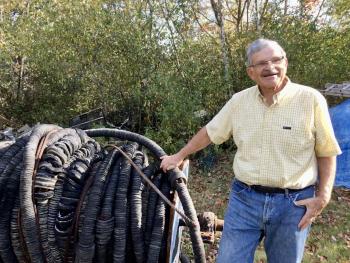Salvatore "Sam" Novello

Strengthening Community Resilience in America’s Oldest Seaport
In partnership with the Northeast Fisheries Science Center, these oral history recordings capture the invaluable life experiences of long-lived members of Gloucester's working waterfront, one of the oldest fishing communities in the United States.
Molly Graham interviewed Captain Salvatore ‘Sam’ Novello on August 2, 2019, for the Strengthening Community Resilience in America’s Oldest Seaport Oral History Project. Captain Novello was born in 1943 in Gloucester, Massachusetts, where he has lived all his life. Son of Captain Joseph Novello and Lena (Parisi) Novello, Sam is the last descendant of the Novello and Parisi fishing families who still earns his living as a fisherman. As a child, Sam went to sea with his father, uncles, and cousins – over one hundred family members - on their fleet of eight wooden fishing vessels. As environmental and regulatory changes have occurred, Capt Novello has adapted his fishing locations, techniques, and equipment in pursuit of truly sustainable fishing – in which both the fish and the fishermen are assured long-term survival. With over 10,000 days at sea, Capt Novello is an expert in the waters off New England, especially in the Western Gulf of Maine, where he has sought changes to the way fishing is conducted through the formation of the Gulf of Maine Ocean Resource Alliance (GOMORA) several years ago. Capt Novello is a Vietnam-Era Navy veteran, licensed ocean-going Captain, past President of the Gloucester Marine Railways Corporation, and current President of GOMORA. He is known and respected by regulators, environmental scientists, and overwhelmingly by Gloucester fishermen – who know he understands the hardships they are facing and is a champion of practical solutions to their problems. In this interview, Salvatore ‘Sam’ provides a comprehensive overview of his family's fishing background, tracing it back to his grandfather's initiation into the industry. Novello discusses his own experiences as a fisherman, highlighting the fishing techniques employed and the changes he has witnessed over time, including the impact of stern trawlers on fish populations. He expresses disappointment with the current state of the fishing industry, criticizes NOAA Fisheries for their scientific understanding, and advocates for gear restrictions to preserve fish stocks. Novello also addresses issues such as competition among fishermen, environmental concerns like global warming and pollution, advancements in fishing technology, and the dangers faced by fishermen. He dismisses the fictionalized portrayal of the Andrea Gail and emphasizes the lifelong nature of fishing as a profession. Novello reflects on the effects of the Magnuson-Stevens Act, criticizes the lack of benefits for fishermen, and discusses challenges such as varying regulations and international competition. He acknowledges climate change but feels that not enough attention is given to its impact on fish. Novello concludes by expressing his belief in the industry's permanent decline, the need for adaptation, and his desire to advocate for necessary reforms and inform the public about the reality of fishing.
Please Note: The oral histories in this collection are protected by copyright and have been created for educational, research and personal use as described by the Fair Use Doctrine in the U.S. Copyright law. Please reach out Voices@noaa.gov to let us know how these interviews are being used in your research, project, exhibit, etc. The Voices staff can help provide other useful resources related to your inquiry.
The NOAA mission is to understand and predict changes in climate, weather, oceans, and coasts, to share that knowledge and information with others, and to conserve and manage coastal and marine ecosystems and resources. The Voices Oral History Archives offers public access to a wide range of accounts, including historical materials that are products of their particular times, and may contain offensive language or negative stereotypes.
Voices Oral History Archives does not verify the accuracy of materials submitted to us. The opinions expressed in the interviews are those of the interviewee only. The interviews here have been made available to the public only after the interviewer has confirmed that they have obtained consent.
